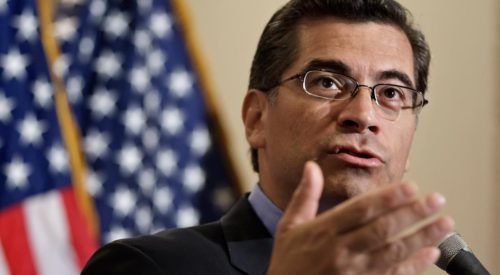California attorney general rebuked for stacking deck against fuel tax repeal
by Chris Reed | October 1, 2017 11:04 am
 Continuing a longstanding bipartisan tradition, California Attorney General Xavier Becerra came under fire[1] in July for ballot measure language considered to be grossly prejudicial by the measure’s proponents. And it didn’t take long for a state judge to agree with this critique.
Continuing a longstanding bipartisan tradition, California Attorney General Xavier Becerra came under fire[1] in July for ballot measure language considered to be grossly prejudicial by the measure’s proponents. And it didn’t take long for a state judge to agree with this critique.
Assemblyman Travis Allen, R-Huntington Beach, is sponsoring a measure to repeal the fuel tax and vehicle fee hikes approved this spring[2]. The description given to Allen’s proposal by Becerra’s office didn’t mention taxes or fees. Instead, it said the measure “eliminates recently enacted road repair and transportation funding by repealing revenues dedicated for those purposes.”
Allen’s lawyers said the description was fundamentally deceptive. Last week, Sacramento Superior Court Judge Timothy M. Frawley agreed[3]: “The Attorney General’s title and summary … must be changed to avoid misleading the voters and creating prejudice against the measure,” he wrote.
The revision Frawley ordered: “Repeals recently enacted gas and diesel taxes and vehicle registration fees. Eliminates road repair and transportation programs funded by these taxes and fees.”
The perception of attorneys general using ballot language to manipulate voters has been common for decades.
When Becerra’s predecessor, fellow Democrat Kamala Harris, was attorney general before her election in November to the U.S. Senate, Republicans alleged she was particularly ready to put her thumb on the scale. The ballot description for 2016’s successful Proposition 58[4] made it seem as if it reinforced English-learning standards in state public schools when its primary intent was to repeal mandatory English-only immersion programs required by 1998’s Proposition 227[5]. In 2015, Harris was trashed [6]by the San Francisco Chronicle’s editorial board for effectively killing pension reform measures with what the board called ballot descriptions that sounded like “union talking points.”
When Gov. Jerry Brown was attorney general before Harris, his office also courted controversy. Two of his ballot descriptions were castigated by state judges in the same week in August 2010.
One was for Proposition 23[7], an unsuccessful measure which would have suspended implementation of state climate-change pollution rules. The initial ballot language was condemned as prejudicial and misleading[8] by Frawley, the same judge who recently ruled against Becerra.
Two days after Frawley’s ruling, Sacramento Superior Court Judge Patrick Marlette rejected [9]ballot language for Proposition 25[10]. The successful ballot measure’s key change was to allow the state Legislature to approve a state budget on a simple majority vote. The ballot language Brown approved made it appear as if the measure’s main intent was to reinforce the requirement that the Legislature could only approve tax increases on a two-thirds vote of both the Assembly and the Senate.
Republican attorneys general also accused of voter manipulation
But in the 20th century, when it wasn’t unusual to have Republicans holding statewide office in California, GOP attorneys general drew fire as well for their perceived ballot language machinations.
The most famous example was in 1978, when California voters approved Proposition 13[11] to put sharp limits on how much property taxes could increase annually. Neither the ballot title or summary approved by GOP Attorney General Evelle Younger mentioned that it also would raise the threshold for raising taxes in the Legislature to a two-thirds vote.
In 1996, Republican Attorney General Dan Lungren also drew fire over the ballot language he approved for Proposition 209[12], a successful measure limiting the use of racial preferences by state government. In 2012, Chronicle editorial page editor John Diaz revisited criticism first made in 1996, arguing [13]that Lungren used “loaded words” to sell opposition to affirmative action.
- under fire: http://www.latimes.com/politics/essential/la-pol-ca-essential-politics-updates-state-releases-title-and-summary-for-1499738419-htmlstory.html
- approved this spring: http://www.latimes.com/politics/essential/la-pol-ca-essential-politics-updates-senate-on-gas-1491508666-htmlstory.html
- agreed: http://www.latimes.com/politics/essential/la-pol-ca-essential-politics-updates-judge-rewrites-title-for-proposed-1506388339-htmlstory.html
- Proposition 58: https://ballotpedia.org/California_Proposition_58,_Non-English_Languages_Allowed_in_Public_Education_(2016)
- Proposition 227: https://ballotpedia.org/California_Proposition_227,_the_%22English_in_Public_Schools%22_Initiative_(1998)
- trashed : http://www.sfchronicle.com/opinion/editorials/article/Attorney-General-Kamala-Harris-skews-ballot-6451702.php
- Proposition 23: https://ballotpedia.org/California_Proposition_23,_the_Suspension_of_AB_32_(2010)
- prejudicial and misleading: http://articles.latimes.com/2010/aug/04/local/la-me-climate-change-20100804
- rejected : http://www.mercurynews.com/2010/08/05/key-ruling-throws-out-claim-that-prop-25-would-protect-two-thirds-vote-on-taxes/
- Proposition 25: https://ballotpedia.org/California_Proposition_25,_Majority_Vote_for_Legislature_to_Pass_the_Budget_(2010)
- Proposition 13: https://ballotpedia.org/California_Proposition_13_(1978)
- Proposition 209: https://ballotpedia.org/California_Affirmative_Action,_Proposition_209_(1996)
- arguing : http://www.sfgate.com/opinion/diaz/article/Loading-the-ballot-language-2759736.php
Source URL: https://calwatchdog.com/2017/10/01/california-attorney-general-rebuked-stacking-deck-fuel-tax-repeal/